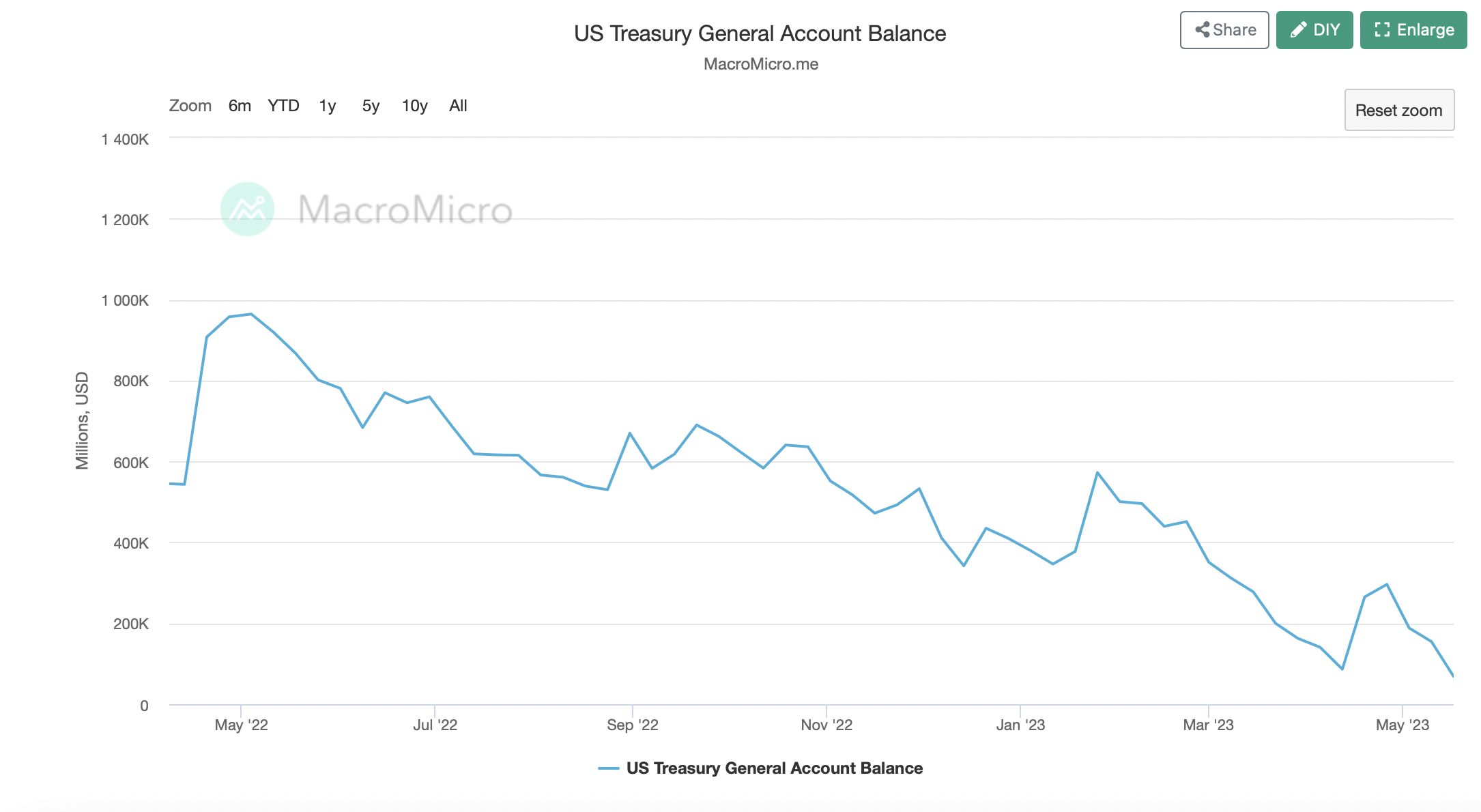U.S. Debt Deal Could Weigh On Bitcoin Price, Some Say

The Treasury’s efforts to build back cash balances after resolution of the debt limit situation might suck out dollar liquidity from system, pushing bitcoin lower.
As the deadlock in negotiations to raise the U.S. government’s $31.4 trillion debt limit keeps markets tentative, some analysts have gone against consensus, warning that a potential deal may bring pain to the crypto market.
The U.S. reached its statutory debt limit of $31.4 trillion on Jan. 19., pressing the Treasury to implement extraordinary measures and run down its Treasury General Account (TGA) balance to keep the government functioning. That ensured assets like bitcoin, which are sensitive to swings in the U.S. dollar liquidity, remained bid amid fears of government default and the Federal Reserve’s continued rate hikes.
The TGA balance has declined from roughly $500 billion at the start of February to $68 billion last week, according to MacroMicro. Per Goldman Sachs, Treasury’s cash balance will likely dip to the minimum required $30 billion in early June, which means a debt deal needs to be reached by around that point to avoid a what some believe would be a catastrophic default.
It also means that once the debt limit is raised, the Treasury will look to build back its cash balance by issuing government bonds. That may suck out liquidity from the system and put upward pressure on bond yields as increased issuance would tend to push prices down and lift yields. Bitcoin (BTC) is known to move in the opposite direction of bond yields.
Thus, while a potential deal might eliminate major economic uncertainty, assets like bitcoin that have no linkages to the real economy and are heavily dependent on fiat liquidity could, in fact, suffer.
“The issuance of debt to top up coffers will have the opposite effect – money will move out of cash and risk assets into U.S. government bonds, especially as yields on these instruments rise to offset the increase in supply,” Noelle Acheson, former head of research at CoinDesk and Genesis Trading and the author of Crypto Is Macro Now newsletter, said in the weekend edition of her newsletter.
“This could be bad for bitcoin and gold, which in theory fall in price when yields are rising (high yield environments tend to not be great for assets that yield nothing),” she added. “What’s more, the issuance of more U.S. government debt would increase public spending, which would be good for the economy, further delaying the likelihood of rate cuts.”
Market consensus so far has been that a default would lead to panic selling and a global dash for cash, similar to the one seen during the coronavirus-induced crash of March 2020 when bitcoin tanked by over 50%. Meanwhile, a debt deal is expected to fuel risk-on action.
Per some observers, bitcoin drew haven bids during the March banking crisis, although other rate-sensitive assets like tech stocks also performed well as traders priced in an early Fed pivot toward rate cuts. In other words, bitcoin remains a largely liquidity-sensitive risk asset.

Taking issue with that outlook is Satyakam Gautam, rates trader at India-based ICICI Bank, who expects the Treasury will likely issue $700 billion of bonds in the next couple of months, leading to massive risk aversion.
“What it implies is a lack of USD funding in the immediate short term post the successful ceiling negotiation, if any. Corporate bonds markets, as well as private credit, will find it hard to roll over existing maturities and this will lead to a real crash in either commercial real estate assets funding or plain junk bond issuers. This might be the real deal crash which the U.S. rate markets have been elusively looking for,” Gautam said in a LinkedIn post.
“There might be then a secular fall in long-end rates as well as massive steepening in U.S. rates. This should augur well for risk haven [forex] like JPY & CHF,” Gautam added.
Edited by Stephen Alpher.
BY: Omkar Godbole
DISCLOSURE
Please note that our privacy policy, terms of use, cookies, and do not sell my personal information has been updated.
The leader in news and information on cryptocurrency, digital assets and the future of money, CoinDesk is a media outlet that strives for the highest journalistic standards and abides by a strict set of editorial policies. CoinDesk is an independent operating subsidiary of Digital Currency Group, which invests in cryptocurrencies and blockchain startups. As part of their compensation, certain CoinDesk employees, including editorial employees, may receive exposure to DCG equity in the form of stock appreciation rights, which vest over a multi-year period. CoinDesk journalists are not allowed to purchase stock outright in DCG.










